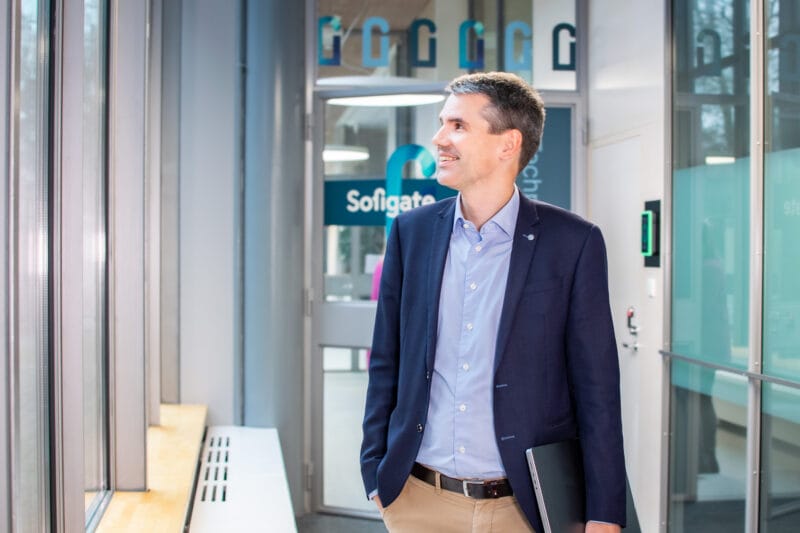AI agents don’t stumble over technology, but over a lack of leadership
Recent studies show that only a small share of organisations have adopted AI agents so far. In a study conducted by Sofigate in the spring, more than 60% of respondents said that AI had not yet delivered significant business benefits. Where benefits had been achieved, they came from AI agents built on business platforms.
According to a follow-up survey carried out at the end of 2025, adoption has progressed, but still only 10% of respondents say that more than ten agents are in use across their entire organisation.
A survey conducted by ServiceNow found that 74% of organisations have not yet implemented a single agent, although nearly half of them plan to do so within the next year. A similar Salesforce survey reported a figure of 66%.
Download the market study: “What does a successful AI-first organisation look like?”
Agent adoption is stalling
The potential of AI agents embedded in business processes and workflows is obvious. Why then have organisations not gained momentum in using them?
The challenge is not the technology itself. The real obstacle lies in the lack of unified operating and governance models, which is seriously slowing down the introduction of AI agents.
The situation could be compared to a internship recruitment campaign where dozens of interns are brought into the workplace at once.
When hiring human interns, the process is usually clear and well-structured. The organisation identifies which departments need interns, how many are required, and what they will do. Recruitment is handled centrally to ensure consistent quality.
When the interns arrive, whether in groups or individually, the organisation has a good overview of them and control over the process, ensuring smooth onboarding. This allows interns to learn the company’s practices and quickly become productive. Each intern has a named supervisor who ensures that the intern performs well and enjoys the work. Other employees also know what to expect from each intern and when to ask for help.
But imagine what would happen if every team in every department hired a new intern every day without telling anyone in advance, or at all. Without approval. Without a clear idea of what the intern will do. Without anyone responsible for onboarding. Without any performance follow-up. And without informing others how the interns could support them.
The likely outcome would be a corridor full of idle interns while regular employees walk past, stressed and overworked.
That is exactly what happens in many organisations today. Instead of human interns, virtual corridors are filled with AI agents and functionalities left in pilot mode or limited use.
AI agents need onboarding and leadership just like people
For AI agents, the recruitment and onboarding process described above takes only a fraction of the time, but the same principles apply. Organisations urgently need clear governance and leadership models. These are required not only to develop new AI agents, but also to ensure that each agent has clear ownership. Business needs must guide AI development, which should progress far faster than traditional agile methods while still maintaining control.
In practice, the governance model must address very concrete questions. How does the organisation decide which agents to deploy next? What factors guide prioritisation? What data can each agent access? In what forum, and how often, is an agent approved for deployment? And so on.
The most forward-thinking organisations are already using AI agents to support their governance model. Agents can guide people to act according to shared practices. For example, when a new development idea arises, an AI agent can advise how to document it consistently with other business needs and suggest who to contact next, whether another person or agent, to take it forward.
No AI agent is ready straight out of the box. Each one must be trained to understand the organisation’s ways of working. Every AI agent deployment is its own transformation, which must be led systematically to ensure that people’s established habits evolve and that agents create real value.
Are AI agents the interns of the future?
The comparison between AI agents and interns is not accidental. The rapid development of AI agents highlights the same dilemma faced by young professionals at the start of their careers. AI agents are increasingly able to perform the simple, routine tasks that many people begin with. But how can anyone learn the basics if those entry-level tasks no longer exist?
Rather than pessimism, there is room for optimism. What if, with the help of AI agents, interns could master more complex tasks much faster than before and move on to more demanding roles sooner?
HR leaders who are thinking about the future workforce should prepare for organisations that include not only human employees but also AI agents working alongside them. How many organisational charts already include agents? And how many HR leaders are considering a title change from Chief Human Resources Officer to Chief Work Officer – shifting the focus from managing people to managing work itself?

About the author
Juho Nevalainen works as an Executive CTO of Sofigate’s BT Integrator business, he is also the owner of Sofigate’s AI Agents programme and the leader responsible for Sofigate’s AI offering.
BT Integrator supports growth-driven organisations in complex business transformation projects by bringing together Sofigate’s management and technology services from strategic planning to project management and continuous IT service operations.
Juho has extensive experience in IT management and business development consulting, concept development and commercialisation, as well as in leveraging artificial intelligence for business planning.
Want to learn more?
We’re glad to tell you how we can help your organisation grow and develop – feel free to contact us!


